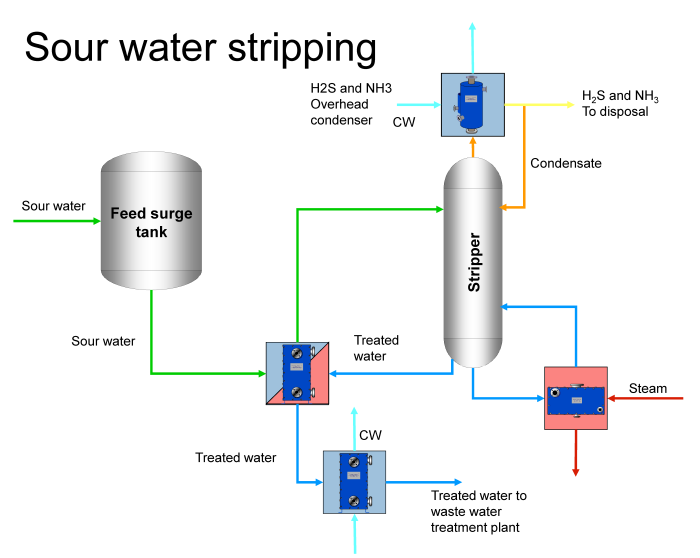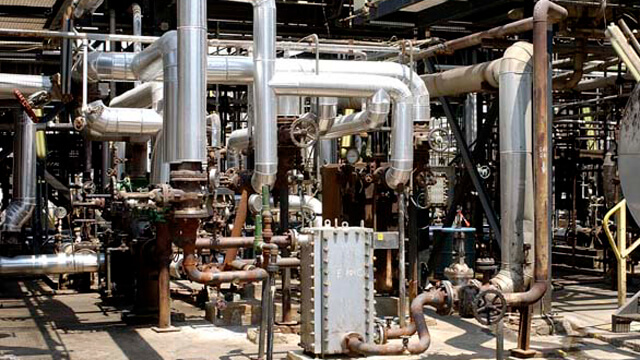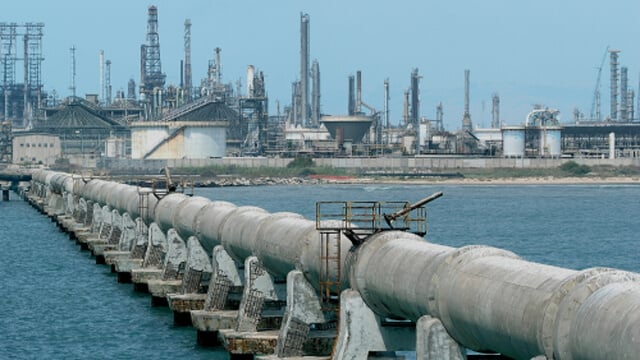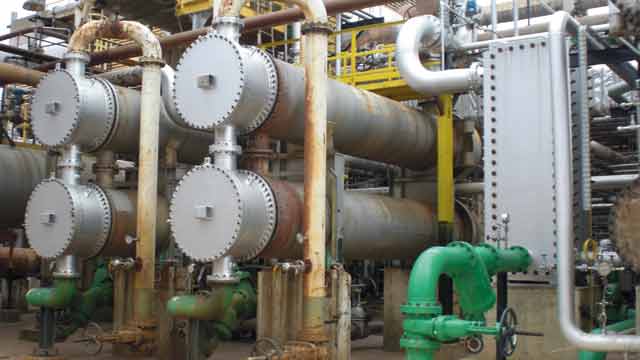Sour water stripping
Stripping hydrogen sulfide and ammonia from refinery sour water prior to subsequent reuse or wastewater treatment calls for highly reliable, corrosion-resistant, low-fouling equipment. Alfa Laval Compabloc heat exchangers do the job, minimizing fouling and corrosion problems in refinery sour water strippers in refineries world-wide while maximizing energy efficiency and uptime.
Optimizing sour water stripping processes
Refinery sour water units aim to maximize water reuse by applying heat to strip hydrogen sulfide and ammonia from process water. Alfa Laval has the expertise, technology and services to maximize energy efficiency and minimize fouling and corrosion problems.
Increasing energy efficiency in sour water stripping
Energy is recovered when sour water is preheated before the stripper by means of stripped water. The more energy recovered in this service, the less energy needs to be provided to the stripper reboiler in terms of steam.
Alfa Laval Compabloc heat exchangers can be designed with a temperature approach of as little as 5°C. This maximizes energy recovery, thereby minimizing steam consumption in the reboiler.
The stripper reboiler is generally designed as a kettle-type reboiler. These typically require a large temperature difference between the boiling media and the steam. This means that a higher pressure steam is required to run the reboiler.
When Alfa Laval Compabloc exchangers are used as rising film thermosiphon reboilers for the sour water stripper column, a temperature difference of less than 10°C is possible to initiate boiling and create natural circulation through the reboiler. This often means that it is possible to use more readily available low-pressure steam instead of medium-pressure steam.
Mitigating fouling
There are different types of fouling deposits. Fouling can take form as corrosion particles that typically come from the stripping tower, or as sludge coming from the sour water tank when there are process upsets and hydrocarbon carry-over into this tank. To minimize fouling tendencies, Alfa Laval Compabloc heat exchangers are designed for maximum shear stress and turbulence in the heat transfer channels, which greatly reduce the risk of fouling.
Improving corrosion resistance in sour water stripping
If there is a high content of hydrogen sulfide in the water, the risk of corrosion increases. In many cases, carbon steel material cannot be used, and the use of a higher grade of material is required. To minimize the risk of corrosion, standard Alfa Laval Compabloc heat exchangers are made of AISI 316L stainless steel. Moreover, higher grades of material are readily available upon request.
Safeguarding processes through reliable, leak-proof design
Because hydrogen sulfide is a lethal compound, the risk of leakage from heat exchangers handling this media must be minimized. Alfa Laval Compabloc heat exchangers have plate packs that are laser-welded to form heat transfer channels. Because there are no inter-plate gaskets sealing the heat transfer channels to the environment, the risk of external leakage is minimized.
Reducing CAPEX
Heat exchanger cost can also represent a major portion of the total process unit cost, especially if many large traditional shell-and-tube heat exchangers in series are required to maximize energy efficiency or when the use of high-grade material for large shell-and-tube heat exchangers or kettle type reboilers is required.
Using high-efficiency Alfa Laval heat exchangers instead of shell-and-tube units can reduce the heat transfer area by up to three times and minimize the number of heat exchangers required. This increases cost-efficiency. especially when high-grade material is required and installation cost included. This is even more true when installations on construction, such as for overhead condensing services, are required.
Proven technology for refinery sour water stripping
Alfa Laval has more than 150 compact heat exchangers installed in sour water stripper units around the world. These operate as interchangers, reboilers, condensers and coolers, providing refineries with maximum efficiency and uptime while minimizing fouling and corrosion tendencies.




